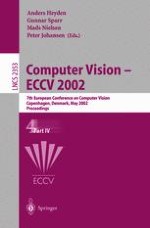2002 | OriginalPaper | Buchkapitel
Statistical Learning of Multi-view Face Detection
verfasst von : Stan Z. Li, Long Zhu, ZhenQiu Zhang, Andrew Blake, HongJiang Zhang, Harry Shum
Erschienen in: Computer Vision — ECCV 2002
Verlag: Springer Berlin Heidelberg
Enthalten in: Professional Book Archive
Aktivieren Sie unsere intelligente Suche, um passende Fachinhalte oder Patente zu finden.
Wählen Sie Textabschnitte aus um mit Künstlicher Intelligenz passenden Patente zu finden. powered by
Markieren Sie Textabschnitte, um KI-gestützt weitere passende Inhalte zu finden. powered by
A new boosting algorithm, called FloatBoost, is proposed to overcome the monotonicity problem of the sequential AdaBoost learning. AdaBoost [1,2] is a sequential forward search procedure using the greedy selection strategy. The premise offered by the sequential procedure can be broken-down when the monotonicity assumption, i.e. that when adding a new feature to the current set, the value of the performance criterion does not decrease, is violated. FloatBoost incorporates the idea of Floating Search [3] into AdaBoost to solve the non-monotonicity problem encountered in the sequential search of AdaBoost.We then present a system which learns to detect multi-view faces using FloatBoost. The system uses a coarse-to-fine, simple-to-complex architecture called detector-pyramid. FloatBoost learns the component detectors in the pyramid and yields similar or higher classification accuracy than AdaBoost with a smaller number of weak classifiers. This work leads to the first real-time multi-view face detection system in the world. It runs at 200 ms per image of size 320×240 pixels on a Pentium-III CPU of 700 MHz. A live demo will be shown at the conference.
